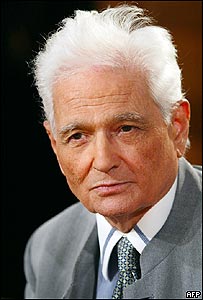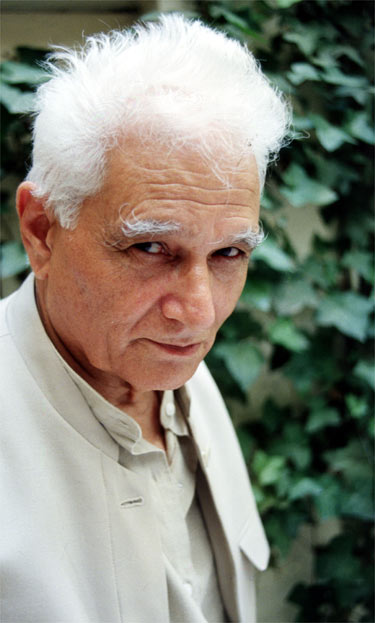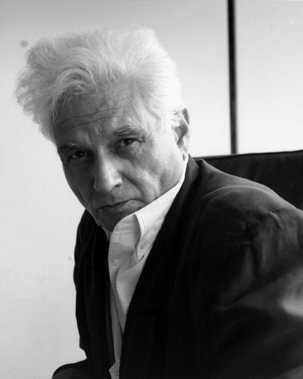<Back to Index>
- Philosopher Jacques Derrida, 1930
- Writer Kunikida Doppo, 1871
- Dictator of Argentina Leopoldo Fortunato Galtieri Castelli, 1926
PAGE SPONSOR



Jacques Derrida (July 15, 1930 – October 9, 2004) was a French philosopher, born in French Algeria. He developed the critical theory known as deconstruction and his work has been labeled as post - structuralism and associated with postmodern philosophy. His prolific output of more than 40 published books, together with essays and public speaking, has had a significant impact upon the humanities, particularly on literary theory and continental philosophy. Perhaps Derrida's most quoted and famous assertion, which appears in an essay on Rousseau in his highly influential Of Grammatology (1967), is the statement that "there is nothing outside the text" (il n'y a pas de hors - texte), meaning that there is nothing outside context. Critics of Derrida have countless times quoted it as a slogan to characterize and stigmatize deconstruction.
Deconstruction has become associated with the attempt to expose and undermine the oppositions and paradoxes on which particular texts, philosophical and otherwise, are founded. He frequently called such paradoxes "binary oppositions." Derrida's strategy involved explicating the historical roots of philosophical ideas, questioning the so-called "metaphysics of presence" that he sees as having dominated philosophy since the ancient Greeks, careful textual analysis, and attempting to undermine and subvert the paradoxes themselves. Derrida's work has had implications across many fields, including literature, architecture (in the form of deconstructivism), sociology, and cultural studies. Particularly in his later writings, he frequently addressed ethical and political themes, and his work influenced various activist and other political movements. His widespread influence made him a well known cultural figure, while his approach to philosophy and the purported difficulty of his work also made him a figure of some controversy. His work has been seen as a challenge to the unquestioned assumptions of the Western philosophical tradition and Western culture as a whole.
Derrida was born on July 15, 1930, in El Biar (Algiers), then French Algeria, into a Sephardic Jewish family originally from Toledo that became French in 1870 when the Crémieux Decree granted full French citizenship to the indigenous Jews of French colonial Algeria. He was the third of five children. His parents, Aimé Derrida (1896 – 1970) and Georgette Sultana Esther Safar (1901 – 1991) named him Jackie, though he would later adopt a more "correct" version of his first name when he moved to Paris. His youth was spent in El-Biar, Algeria.
On the first day of the school year in 1942, Derrida was expelled from his lycée by French administrators implementing anti - Semitic quotas set by the Vichy government. He secretly skipped school for a year rather than attend the Jewish lycée formed by displaced teachers and students, and also took part in numerous football competitions (he dreamed of becoming a professional player). In this adolescent period, Derrida found in the works of philosophers and writers such as Rousseau, Nietzsche, and Gide, an instrument of revolt against the family and society:
| “ | It is true that my interest in literature, diaries, journals in general, also signified a typical, stereotypical revolt against the family. My passion for Nietzche, Rousseau, and also Gide, whom I read a lot at that time, meant among other things: "Families, I hate you." I thought of literature as the end of the family, and of the society it represented. | ” |
His readings also included Camus and Sartre. On his first day at the École Normale Supérieure, Derrida met Louis Althusser, with whom he became friends. After visiting the Husserl Archive in Leuven, Belgium, he completed his philosophy agrégation on Edmund Husserl. Derrida received a grant for studies at Harvard University, and he spent the 1956–7 academic year reading Joyce's Ulysses at the Widener Library. In June 1957, he married the psychoanalyst Marguerite Aucouturier in Boston. During the Algerian War of Independence, Derrida asked to teach soldiers' children in lieu of military service, teaching French and English from 1957 to 1959.
Following the war, from 1960 to 1964, Derrida taught philosophy at the Sorbonne, where he was assistant of Suzanne Bachelard (daughter of Gaston), Canguilhem, Paul Ricœur (who in these years coined the term School of suspicion) and Jean Wahl. His wife, Marguerite, gave birth to their first child, Pierre, in 1963. In 1964, on the recommendation of Althusser and Jean Hyppolite, Derrida got a permanent teaching position at the École Normale Supérieure, which he kept until 1984. In 1965 Derrida began an association with the Tel Quel group of literary and philosophical theorists, which lasted for seven years.
Beginning with his 1966 lecture at Johns Hopkins University, "Structure, Sign, and Play in the Discourse of the Human Sciences", his work assumed international prominence. A second son, Jean, was born in 1967. In the same year, Derrida published his first three books — Writing and Difference, Speech and Phenomena, and Of Grammatology. In 1977, he was among the intellectuals, with Foucault and Althusser, who signed the petition against age of consent laws.
He completed his Thèse d'État in 1980; the work was subsequently published in English translation as "The Time of a Thesis: Punctuations." In 1983 Derrida collaborated with Ken McMullen on the film Ghost Dance. Derrida appears in the film as himself and also contributed to the script.
Derrida traveled widely and held a series of visiting and permanent positions. Derrida was director of studies at the École des Hautes Études en Sciences Sociales in Paris. With François Châtelet and others he in 1983 co-founded the Collège international de philosophie (CIPH), an institution intended to provide a location for philosophical research which could not be carried out elsewhere in the academy. He was elected as its first president. In 1985 Sylviane Agacinski gave birth to Derrida's third child, Daniel.
In 1986 Derrida became Professor of the Humanities at the University of California, Irvine. UCI and the Derrida family are currently involved in a legal dispute regarding exactly what materials constitute his archive, part of which was informally bequeathed to the university. He was a regular visiting professor at several other major American and European universities, including Johns Hopkins University, Yale University, New York University, Stony Brook University, The New School for Social Research, and European Graduate School.
He was awarded honorary doctorates by Cambridge University (1992), Columbia University, The New School for Social Research, the University of Essex, University of Leuven, Williams College and University of Silesia.
Derrida has often been criticized by academics, such as the analytic philosopher Willard Van Orman Quine. In 1992, a number of analytical philosophers from Cambridge University and external institutions tried to stop the granting of the degree, but were outnumbered when it was put to a vote. Derrida suggested in an interview that part of the reason for the violent attacks on his work, was that it questioned and modified "the rules of the dominant discourse, it tries to politicize and democratize education and the university scene."
Derrida was a member of the American Academy of Arts and Sciences. Although his membership in Class IV, Section 1 (Philosophy and Religious Studies) was rejected; he was subsequently elected to Class IV, Section 3 (Literary Criticism, including Philology.) He received the 2001 Adorno - Preis from the University of Frankfurt.
In 2002, Derrida appeared in a documentary about himself and his work, entitled Derrida.
In 2003, Derrida was diagnosed with pancreatic cancer, which reduced his speaking and travelling engagements. He died in a hospital in Paris on the evening of October 8, 2004.

